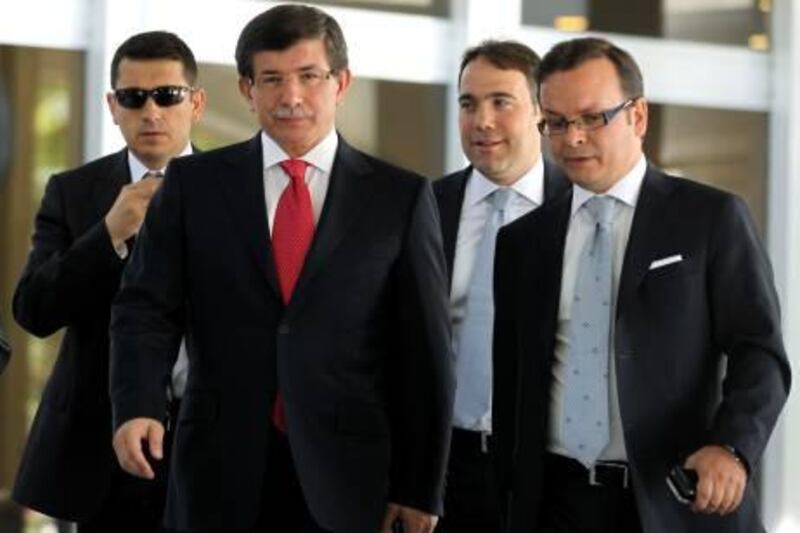ISTANBUL // Turkey said yesterday it wanted the Israeli ambassador to leave the country by Wednesday, bringing relations with former ally Israel to breaking point.
The demand followed Israel's refusal to apologise for a deadly raid on a Turkish aid flotilla for Gaza last year and a United Nations panel that partly exonerated Israel's actions on Thursday.
Ahmet Davutoglu, Turkey's foreign minister, said Israel had lost Turkey's friendship by failing to apologise for the death of nine activists during the raid on May 31, 2010 on the Turkish ship Mavi Marmara. Mr Davutoglu said diplomatic relations between Turkey and Israel would be lowered to second level, a step that requires Gaby Levy, the Israeli ambassador to Turkey, to leave the country.
In an indirect warning to Israel, Mr Davutoglu said Turkey would "take steps to secure free passage in the eastern Mediterranean". Veysel Ayhan, an analyst in Ankara, said this could bring Turkish and Israeli forces head to head. "Fighting could erupt, if Israel attacks Turkish vessels," Mr Ayhan, an analyst at the Centre for Middle Eastern Strategic Studies, a think tank, said in an interview yesterday.
The expulsion of the Israeli ambassador also means Turkey will not send a new ambassador to Israel. The post has been vacant since Turkey called back its envoy after the 2010 raid.
Mr Davutoglu said Turkey had suspended military relations with Israel, would support legal actions against Israeli officials involved in the raid and would take the issue of Israel's blockade of the Gaza Strip to the International Court of Justice in The Hague.
"No state is above the law," Mr Davutoglu said. "The time has come for Israel to face the consequences of its actions and pay the price. First and foremost, this price is being without Turkey's friendship."
Mr Davutoglu's statement marked a new low in relations between Turkey and Israel, two former allies that have fallen out primarily over Israel's policy in the Gaza Strip. The current crisis started after Israel's military operation in Gaza in late 2008.
Mr Ayhan said the latest escalation added to Israel's growing isolation in the region. Referring to concurrent tensions with Egypt, he said Israel should act with more restraint and understanding, but was becoming more radical instead. "Israel is losing all its friends."
Israeli analysts said the latest row was part of Turkey's attempt to become a regional power, which in part stemmed from its rejection by the EU in recent years. In this new strategy, Israel was no longer a very important factor, Yaacov Bar-Siman-Tov, a professor of international relations at the Hebrew University in Jerusalem, said.
"I don't believe the problem here is about the Mavi Marmara. It's an issue that started a couple of years ago, when [Turkey's prime minister Recep Tayyip] Erdogan realised he didn't need Israel anymore in terms of strategic partnership," Prof Bar-Siman-Tov said. "Turkey decided to change its strategy toward becoming a superpower of sorts in the region" after EU membership talks stalled. Mr Davutoglu was a key player pushing this new strategy: "He wants to build turkey into a regional superpower, a new Ottomanism."
Mr Davutoglu's statement yesterday was triggered by a report by the UN committee on the raid on the Gaza flotilla, leaked to The New York Times on Thursday. The report said Israel was within its rights to stop the aid flotilla on its way to break to Israeli naval blockade around Gaza, but used excessive force when it killed the nine activists on the Mavi Marmara. In recent days, Ankara had said the publication of the report was the last chance for Israel to offer an apology or face the consequences.
Mr Davutoglu and Abdullah Gul, Turkey's president, rejected the findings of the UN report. "The report does not count for us," Mr Gul said.
The UN inquiry, led by a former New Zealand prime minister, Geoffrey Palmer, called for Israel to make "an appropriate statement of regret" for the raid and pay compensation to the families of the dead as well as to injured victims. Turkey and Israel should resume full diplomatic relations "repairing their relationship in the interests of stability in the Middle East".
Mr Davutoglu said Turkey was still insisting on an Israeli apology. He said both sides had come to the brink of an agreement several times during four rounds of confidential talks in the 16 months since the raid. A possible agreement was ultimately rejected by the Israeli government, Mr Davutoglu said. He also said several postponements of the UN report had been the result of Israeli demands.
Israel said yesterday it would accept the United Nations report with some reservations. "We will announce our acceptance of the report after its official publication, with specific reservations," a senior official told the AFP news agency. The official stressed that the report had declared Israel's naval blockade of Gaza legal.
Hamas rejected the UN report. "This report yesterday wasn't fair when it comes to the Turkish side. It took the side of the Israelis. Saying that siege on Gaza is legal is inconceivable," Ahmed Yousef, Hamas's deputy foreign minister, told The National. He called Turkey's expulsion of the Israeli ambassador "perfectly normal in a situation like this. They were at least expecting an apology, and they couldn't even get that."





